New WIU President and Moline Mayor to Discuss How to Keep Q-C Campus
Just over six weeks into his new job as Western Illinois University president, Guiyou Huang wrote to Gov. JB Pritzker this past Tuesday, Feb. 16, about ongoing discussions regarding a potential transfer of the WIU Quad-Cities campus in Moline to another state institution.
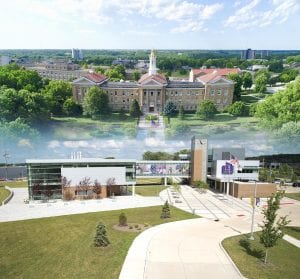
Western Illinois’ main campus in Macomb (top) and the Quad-Cities campus is in Moline
To date, Western has not been included in the discussion, he noted, copying Moline Mayor Stephanie Acri and Quad Cities Chamber president/CEO Paul Rumler. Acri responded that she’s had concerns about the impact of WIU in Moline and she’s scheduled to meet again with Huang on March 2.
“In our conversation in my office this past January, I had a very candid conversation with you about our concerns with Western Illinois University’s decisions that have hurt Moline’s economy,” Acri wrote in response Feb. 16.
“In the subsequent follow-up meeting you had with business and community leaders, they expressed similar concerns to you,” she wrote. “I clearly expressed that Moline was looking for a true partner to help Moline grow and diversify. Our future success is dependent on the children of today having the best options available for them to move into the jobs and opportunities of
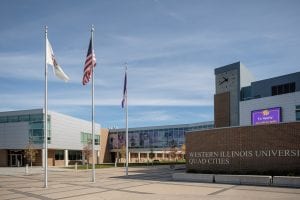
WIU has struggled with Q-C enrollment — seeing 1,267 students in 2018 and 1,192 in 2019.
tomorrow.”
She noted Moline and the Q-C area have an excellent feeder school system and those students need a university that offers quality education and a high quality of life.
When the Q-C campus opened in 2014 at 3300 River Drive, leaders hoped WIU would grow to 3,000 Moline students. In 2018, there were 1,267 Q-C students, dropping to 1,192 in 2019, and most shifting this past fall to online instruction due to Covid-19.
WIU in both Macomb and Moline saw total enrollment plunge from 13,602 in 2006 to 8,502 in 2018.
“Thriving university systems in Illinois and the region provide just such an experience for potential applicants,” Acri wrote. “It’s the type of experience that we want to see in Moline. Our community is vested in growing our economic base by attracting a diverse array of businesses to Moline. Part of that plan includes a university that has a diverse economic program and diverse student body. We want to attract those students to Moline by offering a student experience that provides housing, restaurants, shopping, and athletic engagement.
“In short, we want to combine the natural beauty of our riverside location with a vibrant student experience to keep and attract students to the Quad-City area, while pursuing a four-year degree,” the mayor said. “We see this as vital to the success of Moline, the Quad-Cities and the western half of Illinois.
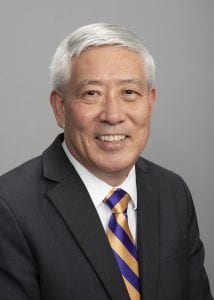
Guiyou Huang became Western Illinois University’s 12th president Jan. 1, 2021.
Huang – who became WIU’s 12th president Jan. 1, 2021 and has met with many community leaders — wrote that they need time to address these issues.
“Before discussions continue between another university and the communities, we would appreciate the opportunity to hear and understand the concerns of community leaders, as well as the reasons why a transfer has even been discussed,” he wrote.
In addition to its main campus in Macomb, WIU has had a presence in the Quad-Cities since 1912. “Today, we remain a strong educational partner in the Quad-Cities as the only public institution of higher education in the region,” Huang wrote. “One of the top priorities the Board of Trustees set in their search criteria was to employ a president who would be able to plan and negotiate a new vision for our Quad-Cities campus.
“It is critical that we are given the opportunity to build on the achievements of our WIU-Quad Cities campus and develop new strategies for growth and community partnerships,” he said.
Economic impact of Q-C campus
WIU is “positioned at the forefront of economic and collaborative partnerships with Macomb and Quad-Cities area business and industry, education, and not-for-profit organizations, and our faculty, staff, and students are integral members of both communities and the surrounding regions,” Huang wrote. “Our main campus in Macomb and our branch campus in Moline provide vital resources to the regions we serve.”
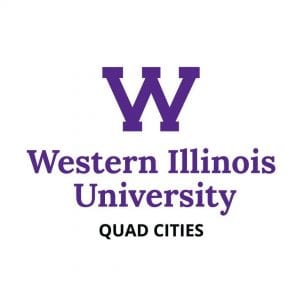
WIU has had a Quad-Cities presence since 1912, and before moving to River Drive in Moline, was at 60th Street off John Deere Road.
WIU impacts the region and the state with economic partnerships, through such means as operations and employment, capital improvement expenditures, and student living expenditures, his letter said. WIU’s economic impact on its 16-county service in western Illinois, including the Q-C, is substantial (from a 2018 economic impact study by the Illinois Institute for Rural Affairs at WIU):
- $361.1 million in annualized output
- $164.1 million in income
- $54.1 million in local, state, and federal revenues
- 3,292 full- and part-time employment positions
WIU-QC is “a destination for quality, applied academic programs through emphasis on practical, hands-on experiences, research, workforce preparation, and career placement, with a commitment to promoting diversity, equity, and inclusion,” the president wrote.
The WIU School of Engineering via the Quad Cities Manufacturing Lab provides manufacturers with developing cutting-edge technologies and processes to remain competitive and at the forefront of innovation, Huang said, noting students contribute expertise and projects to the U.S. Corps of Engineers, John Deere, Kone, Joint Manufacturing Technology Center, and many other private businesses and firms.
“The engineering program also maintains crucial connections with area schools to promote hands-on learning opportunities and inspiration to explore STEM fields,” he wrote.

WIU has struggled with Q-C enrollment — seeing 1,267 students in 2018 and 1,192 in 2019.
WIU established the Great River Teacher Corps to offset the shortage in the region. “WIU partners with schools in our 16-county service region, including Moline High School and Black Hawk College, to increase enrollment in teacher education and provide qualified educators to rural and underserved districts,” Huang wrote.
Through the Illinois Institute for Rural Affairs, WIU annually hosts The Midwest Community Development Institute in the Q-C; delivered its community planning programs in communities in the region; hosted, with WQPT, the “Vibrant Neighborhoods” community engagement meetings in the Floreciente neighborhood; and Peace Corps Fellows have served several communities in the region, including the Global Communities initiative.
WIU is, “and will remain, a critical asset to the State of Illinois and the western Illinois region, and our QC campus is, and must remain, an integral part of WIU and its mission,” Huang said.
On Feb. 17, Gov. Pritzker proposed flat funding for Illinois higher education, which would result in WIU’s 2022 fiscal year higher education state appropriation remaining level at $49.6 million upon approval by the Illinois General Assembly.
“During these challenging budgetary times, particularly in the midst of the Covid-19 pandemic, we are greatly appreciative of Gov. Pritzker’s

Illinois Gov. JB Pritzker.
ongoing commitment to our public universities,” WIU president Huang said.
In addition to the proposal for flat funding for Illinois higher education, Gov. Pritzker has recommended an increase of $28 million for Monetary Award Program (MAP) grants, level AIM High funding and $1 million to fund the Common Application for higher education.
The governor also recommended re-appropriating all of Western’s capital development funds, including funds for the WIU-QC campus in Moline and Center for the Performing Arts (CPA) on the Macomb campus.
“The Governor’s recommendations for higher education provides much needed assistance for our students, and our University is committed to continuing to provide an affordable and accessible education to the citizens of Illinois and beyond,” Huang said.
Local reaction to plans
The city of Moline Facebook page posted the dueling letters between Acri and Huang, met with swift skepticism from those who support WIU here.
Holly Lindsay, a 2015 WIU-QC graduate who has a successful local accounting career, posted on Facebook:
“WIU provides education for those that just want the education — no extra curriculars and at an affordable price. It’s also a great fit for the older generation that otherwise would not consider going back to college when the other two options are A, more expensive and B, considered for the ‘younger’ generation. WIU is also a great transfer school from Black Hawk. A lot of Blackhawk credits don’t transfer to Augie, so I could see Black Hawk suffering from this as well.”

Tuition at WIU is far lower than that at local private colleges Augustana and St. Ambrose.
“I imagine if I had went away for college, my chances of ending up back in the QC would be slim,” she said. “I hope these considerations are discussed and the right decision is made. Western desperately needed a new president, and I’m glad to see that has happened. Give it some time to pay off.”
Rather than “no extracurriculars,” WIU-QC says it has over 25 student organizations, 48 programs of study, and a current cost of $5,091 in tuition and fees per semester. In contrast, the private Augustana College in Rock Island charges $45,136 for tuition per year (not counting housing and meals).
Anna Headley, a current WIU-QC student, posted:
“Removing the QC campus would be disastrous for Moline. As a current senior at WIU-QC, this campus is the only way I would be able to earn a Bachelor’s degree. Both Augustana and St Ambrose are far too expensive to be able to pay without student loans amounting to nearly $50K, and driving to the WIU-Macomb campus for all classes while maintaining a job in Moline would be impossible, requiring a move to Macomb and instead being a part of their economy.
“Attending WIU-QC, I’m able to remain in Moline, my birthplace, and be a part of the local economy both through my job and with my spending,” she said. “I was originally majoring in journalism, a program offered mainly on the Macomb campus. If it wasn’t for WIU-QC, I would have had to either move to Macomb for the rest of college and possibly never move back, or drop out of school because I can’t afford to attend one of the other area schools. Instead, I was able to remain in Moline and major in English, which is fully offered at WIU-QC.”
WIU spokeswoman Darcie Shinberger released this statement Thursday:
“As our University recently moved under new leadership, it is essential that President Huang is provided time to assess WIU’s needs and the communities we serve. One of the top priorities the Board of Trustees set in its search criteria was to employ a president who would be able to plan and negotiate a new vision for our Quad-Cities campus, including developing new strategies for growth and community partnerships.
“We appreciate the Governor’s ongoing commitment to higher education,” she said. “As such, Western Illinois University will continue to be an asset for the State of Illinois and the western Illinois region, and our QC campus will remain an integral part of our University and its mission.”
Huang announced as new chief last fall
The new president of WIU — former head of Edinboro University of Pennsylvania – was named by Western last November. In December, Western’s board approved a two-and-a-half year contract with Huang, which includes tenure within the Department of English and professional development, at an annual salary of $320,000.
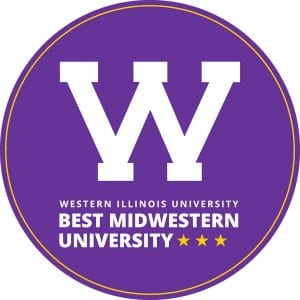
WIU was recently named a Best Midwestern University by US News and World Report.
Huang served as president of Edinboro University of Pennsylvania since July 2019. Under his leadership, the public institution launched and implemented the 2019-2024 University Strategic Plan; developed and executed Financial Sustainability Plans; increased freshman inquiries by 24 percent, applications by nearly 8 percent and admits increased by 17 percent.
“It is an honor and a privilege to be selected as the 12th president of Western Illinois University,” Huang said upon his announcement. “I appreciate the Board’s and search committee’s confidence in my abilities to lead this great institution, as well as the faculty, staff, students, alumni and many others who took part in the interview process.”
He succeeds WIU’s former president, Jack Thomas, who in February 2020 was named president of Central State University in Ohio, a historically Black college. Martin Abraham served as WIU’s interim president.
Previously, Huang served as the chancellor of Louisiana State University of Alexandria from January 2017-June 2019. In this role, he was in charge of the full scope of university operations, budgeting, strategic planning, auxiliary services, among others, and oversaw seven divisions: Academic Affairs, Finance & Administration, Student Engagement, Institutional Advancement & Alumni Relations, Enrollment Management, Marketing and Strategic Communications, and Athletics.
He has also served as the senior vice president for academic affairs and dean of the faculty, acting chief international officer and professor of English at Norwich University in Northfield, Vermont. Huang was the founding dean of the Biscayne College of Liberal Arts, dean of Undergraduate Studies and Programs and professor of English at St. Thomas University in Miami Gardens, Fla.
He earned his doctorate in English from Texas A&M University at College Station; completed graduate studies in English from Beijing University; and his bachelor’s degree from Qufu Normal University. He is also a 2009 graduate of the Harvard Institute for Management and Leadership in Education.
To learn more about WIU-QC, visit www.wiu.edu/qc/about/ or www.facebook.com/WIU.QC/.









